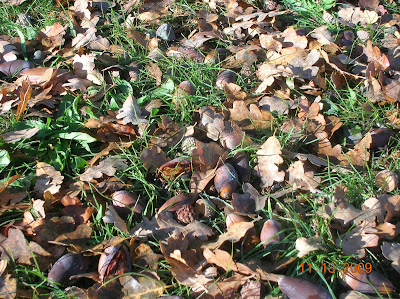
This October, it will be seven years (a magical number if there ever was one, or, well, if there ever was an infinity) since I moved into this little cottage and I'm beginning to hatch plans for an all-night ritual of thanks, celebration, and renewal with this house and this land, including all the various spirits of both. (And, oh, Mama, do they both have spirits and astral presences! Do they ever.) When I first moved into this bungalow surrounded by very old oaks, the sound of acorns ricocheting off the roof would make both me and Miss Thing jump, make us start awake in the night, make us stop and wonder if something was wrong. Now, acorns are one of the sounds that I look forward to hearing in the Fall, almost as comforting as rain on the roof or crickets at dark.
Coming into Mabon, I've been madly harvesting the bounty of this less-than-a-quarter-acre-of-land: basil, thyme, sage, lavender, marigold blossoms (both for salads and for the Day of the Dead), parsley, more basil, dill, rosemary, peppermint, lemongrass, chocolate mint, sunflower seeds, lemon mint, apple mint, more basil, spearmint, oregano, more basil (I've taken to just showing up at work and at the homes of friends and family with bags full of basil and going "Pesto in a bag!" I've still got a ton of basil out there and enough pesto in the freezer to last for a year. I can hear them saying, "Oh no, here she comes again with her basil bombs," but what's a girl to do? Next year, I'll plant less.) , and, above all, beauty, stored in my eyes, and heart, and mind -- lush beauty to feed my soul through the elegant but stark coming months of November, January, and February.
And, I've been thinking a bit, here in my sixth decade, about harvesting. Harvesting, and, hence, Mabon, isn't for the weak. You have to go and take away from either a living animal or a living plant its life, its source of nourishment and/or its sexual organs, children, roots. You have to make decisions, often while tired, overworked, in a rush: Will this bit rot and rot everything around it, or will it preserve nicely and get me through the lean times? Will these seeds go bad or will they sprout, come Spring, and bring me an even more bountiful harvest? Should I leave this job and take this other one? What if I move? What will I do with this degree? How can I use my new-found knowledge? Who will buy this if I make it? Will this relationship bear fruit or poison? When I edit this paragraph, will the new ideas be better than the old?
One of our family rituals -- and the thing that most marks "Autumn" for me -- is our annual trip to the
Maryland Renaissance Festival. I've been taking Son even since before the festival found its
current (magical) location. Last year, drunk on
Redwall movies, G/Son was enchanted w/ the notion that there really is somewhere on Earth where one can buy candied nuts. We bought a paper cone full of cinnamon-sugared almonds and ate them all through the Faire. We meant to buy some more on our way out, but we were tired and forgot. All Winter, G/Son would say to me, "Nonna, the
candied nuts you made are good, but we should have bought more on our way out of the Renaissance Festival." This year, just before we were ready to leave, we left his 'rents having crabs and meade, and ran back to the place selling candied nuts. We bought what G/Son called our "Winter Supply," -- six extra cones full. G/Son explained to me in the car, "In Winter, we can't find too much food, so it's good to have a Winter supply of candied nuts." I could not agree more. I could not agree more. I could not agree more. G/Son speaks for me.
We all need something -- candied nuts, dusty bottles of meade, dried thyme, a knitted blanket, a song, a poem, a circle,
a recipe for soup verte, a cellar full of cider and wine -- that helps us to believe that we will make it through the Winter nights of brilliant stars, freezing fingers, and empty stomachs, into the coming (surely it's coming, of course it's coming, it always comes, please Goddess, let it come) Spring. To me, that's the difference between Mabon and Samhein. Mabon's about the hope. Samhein's about facing the other possibility.
That hope is what those hard-nosed harvesters buy for all of us when they steal the life from the hart, the hare, the seed pod, the turkey, the pumpkin, the potato, the turnip, the chestnut, the kale. May the Goddess guard them. May their spirit be strong in us. This is my will. So mote it be.
Picture found
here.







